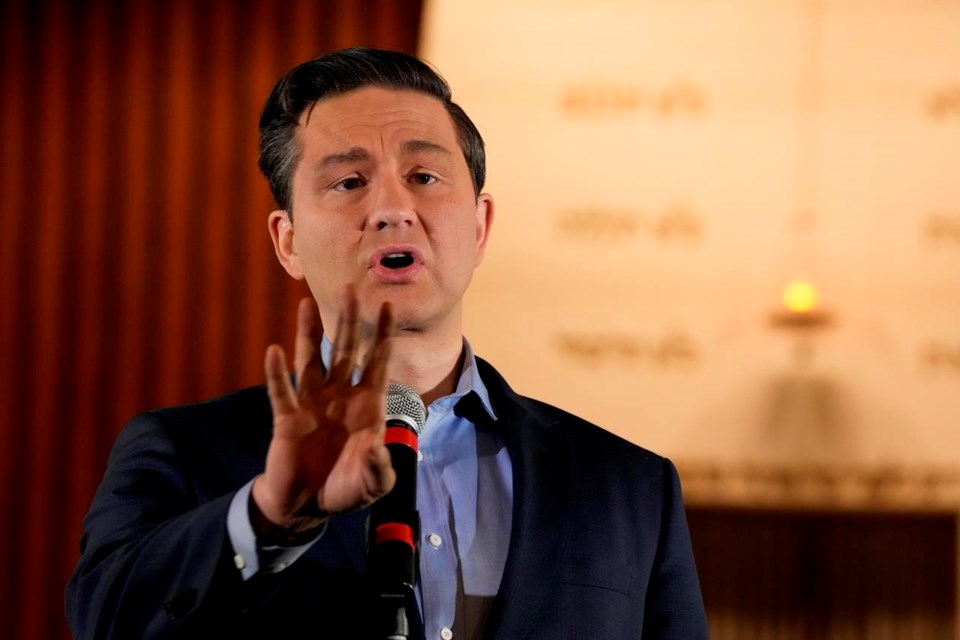OTTAWA — After Tories voted against a bill that implements a Canada-Ukraine free trade agreement this week, Conservative Leader Pierre Poilievre said on Thursday that his MPs are rejecting a bill that promotes carbon pricing — not voting against the idea of an agreement between the two countries.
"There's no reason to promote a carbon tax for Ukrainians or for Canadians. The carbon tax is crippling our people," Poilievre told reporters in Toronto.
The Conservative position has Liberals arguing that the official Opposition is following segments of the U.S. Republican party in chipping away at support for Kyiv against Russia's invasion.
That has led to heated exchanges in the House of Commons as it debates legislation implementing a negotiated update to the existing trade deal.
The proposed text primarily focuses on maintaining market access under an agreement that former prime minister Stephen Harper's Conservative government had originally negotiated. It also includes new investment provisions that Ukraine says could help with an eventual rebuild of the war-torn country.
The text being debated also adds a new environmental chapter in which both countries agree to "promote carbon pricing."
Ukraine has had a price on carbon in place for years, and its ambassador is urging Canada to pass the legislation.
Senior Canadian officials have testified that the language around carbon pricing is meant to clarify that such policies won't hamper bilateral commerce.
"There aren't binding provisions on carbon taxes or climate change," Canada's chief trade negotiator Bruce Christie testified at the House trade committee earlier this month.
"What we've included in this trade agreement is an ability for the parties to discuss — to ensure that any trade initiatives don't hinder parties' abilities to promote climate-change initiatives, and that would include the imposition of a carbon tax."
Conservatives unanimously voted against sending the bill to committee on Tuesday, despite all other parties approving it.
"We brought in the free trade agreement. We voted against Justin Trudeau forcing a carbon tax into that pre-existing agreement," Poilievre said, arguing that carbon pricing has been "devastating" for the Canadian economy.
Poilievre told reporters in Toronto that a carbon tax in Ukraine would impede its economic recovery, even though the country has already had such a tax in place since 2011.
"This is cruel and frankly, it is disgusting, that Trudeau's ideological obsession with taxing working-class people, seniors and suffering families has come ahead of what should have been a free trade agreement," he said.
Trade Minister Mary Ng said on Thursday that she has no regrets about the fact the renewed agreement includes carbon pricing, saying the deal fits the expectations of modern trade agreements and better reflects the needs of Canadian business.
"The agreement that we had before cover goods, by and large. But now you have you have coverage for services, for investments," Ng said in an interview.
"We should applaud the Ukrainians for being able to negotiate an agreement and also fight climate change, and also look at their economic security," she added outside the House of Commons.
Liberal House leader Karina Gould argued that the Tories are abandoning Ukraine and not taking climate change seriously.
"With Tuesday's vote, when the Conservative Party of Canada voted against the Canada-Ukraine Free Trade Agreement on a red herring … there's something deeper going on," she told reporters on Parliament Hill.
"We've seen in right-wing political circles in the United States a hard turn against Ukraine, towards supporting Russia," Gould said, accusing the Tories of ushering in "American-style, right-wing politics."
At least a dozen Liberal MPs echoed that view in the Commons, causing eruptions from the Conservatives that had the Speaker calling for order.
"The Opposition let domestic, petty politics interfere with issues that should have been issues on which we were unified, as Canada always has been. It's appalling," said Toronto Liberal MP James Maloney.
"Want to see Conservative MPs squirm in their seats? Watch them when their leader tries to explain why."
Conservative House leader Andrew Scheer decried such comments as "phony outrage" meant to distract from unflattering economic news.
"What is disgraceful and cruel is using Ukraine's vulnerability, while Russian tanks are on its soil, to shove a carbon tax permanently down their throat."
NDP foreign affairs critic Heather McPherson argued the Conservatives have flip-flopped on their support of Ukraine.
"The Conservatives have a lot of explaining to do. Ukraine's president asked for Canada to support this deal," she wrote, alluding to Volodymyr Zelenskyy's September visit to Ottawa. "This isn’t time for petty politics."
This report by The Canadian Press was first published Nov. 23, 2023.
Dylan Robertson, The Canadian Press
Note to readers: This is a corrected story. A previous version said Ukraine's carbon tax started in 2021.



